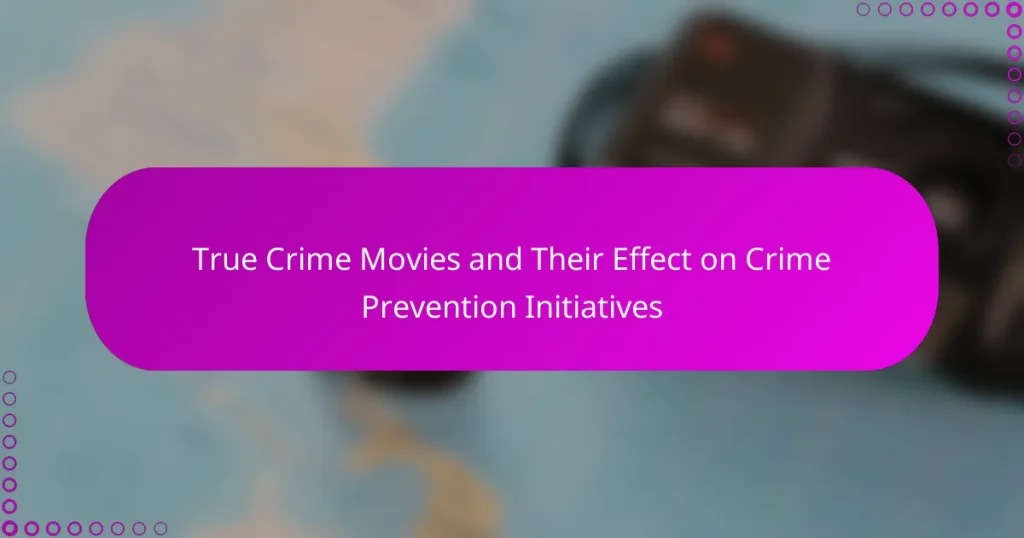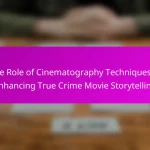True crime movies dramatize real-life criminal events, focusing on notorious cases and their societal implications. These films blend factual accounts with narrative storytelling, evoking strong emotional responses and shaping public perceptions of crime and safety. The growing popularity of the genre reflects an increased interest in understanding criminal behavior, often leading viewers to overestimate the prevalence of violent crime. True crime movies also play a role in crime prevention initiatives by raising awareness about criminal behavior and encouraging discussions about safety measures. Overall, they serve as a catalyst for dialogue and action regarding crime prevention in society.

What are True Crime Movies?
True crime movies are films that dramatize real-life criminal events. They often focus on notorious cases, exploring the details of the crime and its impact. These movies aim to present factual accounts, blending documentary elements with narrative storytelling. True crime films can evoke strong emotional responses from viewers. They often highlight societal issues related to crime and justice. The genre has gained popularity, with many documentaries and dramatizations released in recent years. This trend reflects a growing public interest in understanding criminal behavior. True crime movies can influence public perceptions of crime and the criminal justice system.
How do True Crime Movies differ from other film genres?
True crime movies differ from other film genres by focusing on real criminal cases and the psychological aspects of crime. Unlike fictional genres, true crime films depict actual events, often featuring real people and their experiences. These movies aim to provide insight into criminal behavior and the justice system. They often explore the motivations behind crimes, making them more psychologically engaging. True crime films may include documentary elements, blending factual storytelling with dramatic reenactments. This genre seeks to evoke a sense of realism, often leaving viewers questioning societal issues related to crime. The emotional impact of true crime films can lead to increased public awareness about crime prevention initiatives.
What are the defining characteristics of True Crime Movies?
True crime movies primarily focus on real criminal events and the psychological aspects of crime. They often feature detailed narratives based on actual cases, highlighting the motives and consequences of criminal behavior. These films typically include interviews, archival footage, and dramatizations to enhance storytelling. They aim to provide insight into the criminal mind and the impact on victims and society. True crime movies often evoke strong emotional responses from viewers, fostering a sense of empathy and awareness. Popular examples include “The Zodiac,” “Monster,” and “Making a Murderer.” These films can influence public perception of crime and contribute to discussions on law enforcement and justice.
How do True Crime Movies portray real-life events?
True crime movies portray real-life events by dramatizing actual criminal cases. They often focus on notorious crimes, highlighting the details surrounding the incidents. These films typically include real names, locations, and events to maintain authenticity. They may also incorporate interviews with law enforcement or victims’ families. The portrayal often aims to evoke emotional responses from viewers. Some films emphasize the psychological aspects of criminals. Others focus on the investigative process and legal proceedings. This dramatization can influence public perception of crime and justice.
What is the history of True Crime Movies?
True crime movies emerged in the early 20th century. The genre gained popularity with films like “The Crime of Caretaker” in 1936. It depicted real criminal cases, blending fact with dramatization. The 1960s saw a rise in such films, coinciding with societal interest in crime. Notable examples include “In Cold Blood” in 1967, based on Truman Capote’s book. The genre evolved through the decades, exploring various criminal narratives. The 1990s introduced documentaries, blurring lines between film and reality. Today, true crime movies continue to captivate audiences, reflecting societal fascination with crime.
When did the True Crime genre first emerge in cinema?
The True Crime genre first emerged in cinema during the early 20th century. One of the earliest examples is the film “The Crimes of the Black Cat,” released in 1930. This film showcased real-life criminal cases, blending fact with dramatization. The genre gained popularity through the depiction of notorious criminals and sensationalized stories. By the 1960s, True Crime films became more prevalent, with titles like “In Cold Blood” gaining critical acclaim. This evolution marked a significant shift in how crime stories were represented on screen.
What are some landmark True Crime films that shaped the genre?
Some landmark True Crime films that shaped the genre include “In Cold Blood,” “The Boston Strangler,” and “Zodiac.” “In Cold Blood,” released in 1967, was one of the first films to adapt a true crime story into a cinematic narrative. It was based on Truman Capote’s non-fiction novel, which detailed the brutal murder of a Kansas family. “The Boston Strangler,” released in 1968, focused on the infamous serial killer Albert DeSalvo and highlighted the psychological aspects of crime. “Zodiac,” released in 2007, depicted the hunt for the Zodiac Killer in San Francisco during the late 1960s and early 1970s. These films not only entertained audiences but also raised awareness about real-life crimes and their societal impacts.

How do True Crime Movies impact viewers?
True crime movies significantly impact viewers by shaping their perceptions of crime and safety. They often evoke strong emotional responses, including fear and empathy. Research shows that these films can lead to increased awareness of criminal behavior. A study published in the Journal of Criminal Justice found that viewers of true crime content often overestimate the prevalence of violent crime. This skewed perception may result in heightened anxiety about personal safety. Additionally, true crime movies can stimulate discussions about criminal justice issues. They may also inspire viewers to engage in crime prevention initiatives. Overall, the impact of true crime movies is multifaceted, influencing both individual attitudes and broader societal conversations about crime.
What psychological effects do True Crime Movies have on audiences?
True crime movies can evoke a range of psychological effects on audiences. They often induce feelings of fear and anxiety as viewers confront real-life crime scenarios. This exposure can lead to heightened awareness of personal safety and crime prevention. Research indicates that such films can also foster empathy for victims, allowing audiences to connect emotionally with their stories. Additionally, these movies may desensitize viewers to violence over time, leading to a potential normalization of aggressive behavior. A study published in the “Journal of Communication” found that repeated exposure to violent media can diminish emotional responses to real-life violence. Overall, true crime movies significantly impact viewers’ perceptions and emotional reactions to crime.
How do True Crime Movies influence viewers’ perceptions of crime?
True crime movies significantly influence viewers’ perceptions of crime by shaping their understanding of criminal behavior and societal safety. These films often dramatize real-life events, which can lead to heightened fear of crime among audiences. Research indicates that exposure to true crime narratives can distort perceptions of crime rates, making them seem more prevalent than they are. A study published in the journal “Crime & Delinquency” found that viewers of true crime shows tend to overestimate the likelihood of becoming victims of crime. Additionally, these movies can create stereotypes about criminals, affecting public attitudes toward justice and law enforcement. Overall, true crime movies play a crucial role in framing how viewers interpret crime in their communities.
What emotional responses do True Crime Movies elicit?
True crime movies elicit a range of emotional responses, including fear, anxiety, and fascination. Fear arises from the depiction of real-life crimes and the potential for similar events to occur. Anxiety often follows as viewers confront the darker aspects of human nature and societal issues. Fascination stems from the exploration of criminal psychology and the motives behind heinous acts. Research indicates that these emotional responses can lead to increased awareness of safety and crime prevention strategies. A study published in the Journal of Criminal Justice found that exposure to true crime media can enhance viewers’ understanding of criminal behavior and its societal implications.
Why are True Crime Movies popular among audiences?
True crime movies are popular among audiences due to their gripping narratives and psychological intrigue. These films often explore real-life crimes, which captivates viewers’ interest in the macabre and mysterious. Audiences are drawn to the suspense and the thrill of uncovering the truth behind each case. The portrayal of complex criminal psychology also engages viewers, making them ponder the motives behind the actions of criminals. Additionally, true crime movies provide a sense of closure, as many stories resolve with justice being served. The popularity of this genre is reflected in statistics; for instance, a 2020 report indicated that true crime documentaries saw a 50% increase in viewership during the pandemic. This surge illustrates a growing fascination with crime stories and their resolution among the public.
What societal factors contribute to the appeal of True Crime Movies?
True crime movies appeal to audiences due to societal factors like fascination with crime, fear of danger, and the desire for justice. The portrayal of real-life events resonates with viewers, tapping into a collective curiosity about criminal psychology. Many people feel a sense of safety when consuming these narratives, as they can explore dark themes from a secure distance. Additionally, true crime stories often highlight systemic issues, prompting discussions about social justice. The rise of social media amplifies engagement, allowing fans to share theories and insights. Statistics show that true crime content has gained significant popularity, reflecting a societal trend towards exploring the macabre. This genre provides an avenue for viewers to confront their fears and understand societal flaws, ultimately enhancing its appeal.
How do True Crime Movies fulfill viewers’ curiosity about crime?
True crime movies fulfill viewers’ curiosity about crime by providing detailed narratives of real criminal cases. They explore the psychological motivations behind criminal behavior. These films often present investigative processes, highlighting how crimes are solved. Viewers gain insights into the complexities of criminal justice. Statistics show that true crime content has gained popularity, with a significant rise in viewership over the last decade. This genre engages audiences by blending entertainment with factual storytelling. Research indicates that such films can evoke empathy and a desire for justice among viewers. They also stimulate discussions about crime prevention and societal impacts.

What is the relationship between True Crime Movies and crime prevention initiatives?
True crime movies can influence crime prevention initiatives by raising public awareness about criminal behavior and safety measures. These films often depict real-life cases, highlighting the consequences of crime. This portrayal can educate viewers on the importance of crime prevention strategies. For instance, studies show that audiences may become more vigilant about personal safety after viewing true crime content. Additionally, law enforcement agencies sometimes use these films to engage the community in discussions about crime prevention. The emotional impact of these movies can motivate individuals to take proactive measures. Overall, true crime movies serve as a catalyst for dialogue and action regarding crime prevention.
How can True Crime Movies raise awareness about crime prevention?
True crime movies can raise awareness about crime prevention by highlighting real-life cases and their outcomes. They often depict the consequences of criminal behavior, which can educate viewers on the importance of vigilance. By showcasing investigative techniques, these films can inform the public about how to recognize and report suspicious activities. Additionally, they may feature expert commentary or interviews with law enforcement, providing insights into crime prevention strategies. Studies have shown that media portrayals can influence public perceptions and behaviors related to safety. For example, a report from the National Institute of Justice indicates that crime documentaries can lead to increased community engagement in safety initiatives. This engagement can foster a culture of awareness and proactive crime prevention.
What messages about crime prevention are often conveyed in True Crime Movies?
True crime movies often convey messages about the importance of awareness and vigilance in crime prevention. They typically highlight the need for individuals to be informed about their surroundings. Many films emphasize the role of community involvement in preventing crime. They showcase how collaboration among neighbors can deter criminal activity. Additionally, these movies often illustrate the consequences of inaction during suspicious situations. They may also depict law enforcement’s efforts in solving crimes, reinforcing trust in police work. Statistics show that increased awareness can lead to a reduction in crime rates. Overall, true crime films serve as cautionary tales, urging viewers to take proactive measures for safety.
How do True Crime Movies inspire community action against crime?
True crime movies inspire community action against crime by raising awareness and prompting discussions about criminal justice issues. These films often depict real-life cases, highlighting the impact of crime on victims and communities. By showcasing the consequences of crime, viewers may feel motivated to engage in local initiatives. Research indicates that exposure to true crime narratives can lead to increased community vigilance and support for law enforcement efforts. For example, a study published in the Journal of Criminal Justice found that viewers of true crime content were more likely to participate in neighborhood watch programs. Additionally, these films can galvanize audiences to advocate for policy changes aimed at crime prevention.
What role do True Crime Movies play in shaping public policy on crime?
True crime movies can influence public policy on crime by raising awareness of specific criminal issues. These films often highlight real-life cases that capture public attention. This heightened awareness can lead to increased public pressure on lawmakers. As a result, policymakers may feel compelled to address the issues presented in these films. For example, true crime narratives can shed light on systemic flaws in the justice system. This can prompt reforms aimed at improving law enforcement practices or victim support services. Furthermore, public interest generated by these films can lead to funding for crime prevention initiatives. Studies have shown that media portrayals can shape public perceptions of crime and safety. Thus, true crime movies play a significant role in shaping discussions around crime policy.
How have True Crime Movies influenced law enforcement practices?
True crime movies have influenced law enforcement practices by shaping public perception and investigative techniques. These films often highlight forensic science and investigative methods. As a result, law enforcement agencies have adopted more advanced technologies. For example, the popularity of DNA evidence in films has led to its increased use in real investigations. Additionally, true crime narratives have prompted police departments to improve transparency with the public. This transparency fosters community trust and cooperation in solving crimes. The portrayal of cold cases in true crime media has also motivated law enforcement to revisit unsolved cases. Overall, true crime movies have had a significant impact on how law enforcement approaches crime-solving and community engagement.
What are the potential risks of using True Crime Movies in crime prevention initiatives?
Using True Crime Movies in crime prevention initiatives poses several potential risks. These films may sensationalize crime, leading to public desensitization. This desensitization can diminish the perceived severity of real-life crime. Additionally, True Crime Movies may create fear and anxiety among viewers. Increased fear can result in over-policing or misallocation of resources. The portrayal of criminals can also lead to stigmatization of certain communities. Furthermore, these films might misinform the public about crime statistics and trends. Misleading information can skew public perception and policy decisions. Lastly, there is a risk of glorifying criminal behavior, which may inadvertently inspire copycat crimes.
What best practices can filmmakers adopt to ensure responsible storytelling in True Crime Movies?
Filmmakers can adopt several best practices to ensure responsible storytelling in true crime movies. First, they should prioritize accuracy in their portrayals of events. This involves thorough research and fact-checking to avoid sensationalism. Second, filmmakers must consider the impact on victims and their families. Sensitively addressing their experiences is crucial. Third, they should provide context to the crimes depicted. This can include social, economic, and psychological factors that contribute to criminal behavior. Fourth, filmmakers should avoid glorifying criminals. Presenting them as complex individuals rather than heroes prevents romanticizing their actions. Fifth, including expert commentary can enhance understanding. Experts can provide insights into the criminal justice system and psychological aspects of crime. Lastly, filmmakers should engage with communities affected by the crimes. This helps ensure diverse perspectives are represented. Following these practices contributes to a more ethical approach to storytelling in the genre.
True crime movies are films that dramatize real-life criminal events, focusing on notorious cases and their societal implications. This article explores the characteristics of true crime films, their historical evolution, and their emotional impact on viewers. It examines how these movies influence public perceptions of crime and justice, as well as their role in crime prevention initiatives. Additionally, the article discusses the potential risks associated with sensationalism in true crime storytelling and outlines best practices for filmmakers to ensure responsible representation of real-life events.


